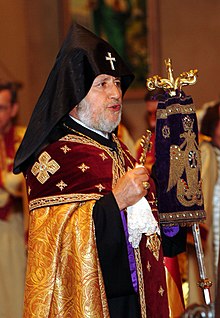Catholicos of All Armenians
This article includes a list of references, related reading, or external links, but its sources remain unclear because it lacks inline citations. (March 2013) |
Catholicos of All Armenians | |
|---|---|
| Bishopric | |
| apostolic | |
 | |
 Karekin II's coat of arms | |
| Incumbent: Karekin II since 4 November 1999 | |
| Style | His Holiness |
| Information | |
| First holder | Saint Gregory the Illuminator |
| Established | 301 |
| Diocese | Mother See of Holy Etchmiadzin |
| Cathedral | Etchmiadzin Cathedral, Vagharshapat, Armenia |
| Website | |
| www | |
The Catholicos of All Armenians (Armenian: Ամենայն Հայոց Կաթողիկոս) is the chief bishop and spiritual leader of Armenia's national church, the Armenian Apostolic Church, and the worldwide Armenian diaspora. The Armenian Catholicos (plural Catholicoi) is also known as the Armenian Pontiff (Վեհափառ, Vehapar or Վեհափառ Հայրապետ, Vehapar Hayrapet) and by other titles. According to tradition, the apostles Saint Thaddeus and Saint Bartholomew brought Christianity to Armenia in the first century.[1] Saint Gregory the Illuminator became the first Catholicos of All Armenians following the nation's adoption of Christianity as its official religion in 301 AD. The seat of the Catholicos, and the spiritual and administrative headquarters of the Armenian Church, is the Mother See of Holy Etchmiadzin, located in the city of Vagharshapat.
The Armenian Apostolic Church is part of the Oriental Orthodox communion. This communion includes the Coptic Orthodox Church of Alexandria, the Ethiopian Orthodox Tewahedo Church, the Syriac Orthodox Church, the Malankara Orthodox Syrian Church, and the Eritrean Orthodox Tewahedo Church.
The current Catholicos is Karekin II.
Other names
[edit]The Catholicos is often referred to both by the church and the media as the Armenian Pontiff.[2][3] Historically, the Catholicos was known in English and other languages as the Armenian Patriarch or the Patriarch of Armenia, and sometimes as the Patriarch of Etchmiadzin (or Echmiadzin) to distinguish from the Armenian Patriarch of Constantinople and the Armenian Patriarch of Jerusalem.[4][5][6] To distinguish from the Catholicos (or Patriarch) of Cilicia, historically based in Sis and now in Lebanon, he may be referred to as the Catholicos of Etchmiadzin.[7][8] To underscore his supremacy over other patriarchs, the Catholicos is sometimes referred to in English as the Armenian Pope.[9]
See also
[edit]- Seats of the Catholicos of Armenians
- Holy See of Cilicia
- List of catholicoi of all Armenians
- List of Armenian catholicoi of Cilicia
References
[edit]- ^ Curtin, D. P. (January 2014). The Martyrdom of St. Bartholomew: Greek, Arabic, and Armenian Versions. ISBN 9798868951473.
- ^ "The Message of the Armenian Pontiff on the 2020 Artsakh War". armenianchurch.org. Mother See of Holy Etchmiadzin. 30 September 2020. Archived from the original on 3 December 2022.
- ^ "Armenian Pontiff To Visit Azerbaijan". azatutyun.am. RFE/RL. April 22, 2010.
- ^ Fortescue, Adrian (1909). "Eastern Churches: Armenians". The Catholic Encyclopedia Vol. 5. New York: Robert Appleton Company. Archived from the original on 2022-11-24.
The first is the Patriarch of Etchmiadzin, who bears as a special title that of catholicos.
- ^ Tsimhoni, Daphne (1984). "The Armenians and the Syrians: Ethno-Religious Communities in Jerusalem". Middle Eastern Studies. 20 (3): 355. doi:10.1080/00263208408700589.
A final reconciliation between the patriarch of Etchmiadzin and the Catholics of Cilicia took place in Jerusalem in 1963.
- ^ Tozer, Henry Fanshawe (1881). Turkish Armenia and Eastern Asia Minor. London: Longmans, Green, and Company. p. 161.
...confirmed by the patriarch of Etchmiadzin, who is the head of the whole Armenian community throughout the world.
- ^ Corley, Felix (1996). "The Armenian Church under the Soviet regime, Part 2: The leadership of Vazgen". Religion, State and Society. 24 (4): 292. doi:10.1080/09637499608431748.
...the archbishops and bishops, being under the influence of the Dashnaks, tried to sabotage the calling of a Council in Echmiadzin to elect the head of the Church, the Catholicos of All the Armenians.'
- ^ "ADDRESS OF HIS HOLINESS POPE JOHN PAUL II TO CATHOLICOS OF CILICIA". vatican.va. Libreria Editrice Vaticana. 25 January 1997. Archived from the original on 2022-06-29.
...His Holiness Karekin II, who last December, as Catholicos of Etchmiadzin, returned to pay a visit to the Successor of Peter, thereby confirming our fraternal ties.
- ^ Barry, James (2018). Armenian Christians in Iran: Ethnicity, Religion, and Identity in the Islamic Republic. Cambridge University Press. p. 97. ISBN 9781108429047.
The Catholicos of Etchmiadzin is recognised as the overall head of the church (much like an Armenian "Pope")...
- Laqueur, Walter (1956). Communism And Nationalism In The Middle East. London: Routledge. p. 233.
...on the "Armenian Pope," the Catholikos in Etchmiadzin, near Erivan.
- "Our Churches - Armenian Apostolic Church". ncca.org.au. National Council of Churches in Australia. 11 February 2019. Archived from the original on 3 November 2022.
Armenian Pope, His Holiness Karekin II, Supreme Patriarch and Catholicos of All Armenians visits Australia.
- Laqueur, Walter (1956). Communism And Nationalism In The Middle East. London: Routledge. p. 233.
